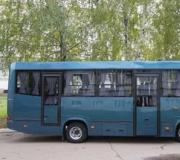How Kudryash and Kuligin perceive the surrounding nature. Kuligin - the hero of drama A
A.N. Ostrovsky, in the play “The Thunderstorm,” written in 1859, showed the life and customs of Russian provincial society of that time. He revealed the moral problems and shortcomings of this society, showing the main features of tyranny.
In his play, Ostrovsky took the action beyond family life V wide scope publicity: on a city street, in a square, in a public garden, and surrounded the main characters with representatives of different segments of the population. One such “representative” is Kuligin - a tradesman, a self-taught mechanic, who socially opposes both the Wild One and Kabanikha, because he does not accept Kalinov’s cruel morals and, according to Dobrolyubov, Kuligin, like Katerina, personifies another life in the “dark kingdom”, with different beginnings.” True, Kuligin, unlike Katerina, softens the relationship between the “dark kingdom” and its victims. He preaches more patience and submission. So, for example, when Kudryash rebuffs Dikiy, Kuligin objects: “It’s better to endure it,” and in response to Dikiy’s threats he says: “There’s nothing to do, we must submit!” And Dikoy calls Kuligin a “worm.” “Tatar”, “robber”, he wants to send this modest inventor “to the mayor” and wants to refute knowledge with wild superstition. Kuligin is not a fighter, he defends his human dignity timidly, naively referring to the authority of Lomonosov and Derzhavin. He also naively believes in the perpetum mobile, which will help downtrodden people alleviate their lot. Kuligin cares “for the common good,” he worries about the groundless fears of the townspeople, he himself is devoid of any superstitions. He is offended by the darkness and ignorance of the Kalinovites, the morals of this city. Imeeno Kuligin says: “Cruel morals, sir, in our town, cruel! In philistinism, sir, you will see nothing but rudeness and naked poverty.”
Kuligin is a kind and considerate man, he dreams of changing the lives of the Kalinovsky poor people by receiving an award for the discovery of a perpetual motion machine, but all his technical ideas are an anachronism for the 19th century. Sundial the ones he dreams about came from antiquity, the perpetum mobile is a medieval idea, the lightning rod is a technical discovery of the 18th century. He often looks funny and eccentric. For the Kalinovites, Kuligin is something of a local holy fool.
Kuligin is very sensitive to nature, in this sense he is a subtle person. His soul rejoices beyond belief beautiful scenery, he is ready to compose hymns to nature. For example, in order to convey to the crowd his sense of beauty and harmony, he speaks about nature in the words of Lomonovsov6 “Well, what are you afraid of, pray tell! Now every grass, every flower is rejoicing, but we are hiding, afraid, as if some kind of misfortune!.. The northern lights will light up - you should admire and marvel at the wisdom: “The dawn rises from the midnight lands”! and you are horrified and are imagining whether it’s for war or for the sea...”
Despite Kuligin’s weak protest against the “Dark Kingdom”, the meaning of his remarks and monologues is an ideological commentary on what is happening, he is still the moral judge of the Wild One, Kabanikha and all that they represent. It is not for nothing that in the last act of the play it is Kuligin who carries Katerina’s body to the banks of the Volga and utters words full of reproach:
Here's your Katerina. Her soul is no longer yours: she is now before a judge who is more merciful than you!
Kuligin is a moral judge of the “dark kingdom,” which is perhaps why some critics called him a “ray of light.”
The play "The Thunderstorm" - most significant work A. N. Ostrovsky. In it, he raises the most vital questions of his time and exposes colorful characters to the reader's judgment.
List characters"Thunderstorms" is small. These are the Kabanovs and the inhabitants of their house: the family of Wild Vanya Kudryash, Shapkin, Kuligin and several minor characters.
Kuligin occupies a special place among the heroes. The reader meets him at the very beginning of the play. Kuligin's image immediately attracts the reader's attention.
Kuligin is a tradesman, a self-taught watchmaker, but he knows how to feel beauty, he is poetic. Looking at the Volga, the hero exclaims with ecstasy: “The view is extraordinary! Beauty!”, and the fact that he has been contemplating the Volga every day for fifty years does not prevent him from enjoying its beauties. Kudryash calls Kuligin an antique, that is, rare, an extraordinary person. For the city of Kalinov, this hero is truly an exceptional phenomenon. He compares favorably with many characters in the play, who are unlikely to ever appreciate the same beauty of the Volga landscape.
His monologues are of great importance for revealing Kuligin’s character. Kuligin angrily attacks Kalinov's order. His words about disdain for the poor people, about the cruel deception of honest workers, about squabbles between merchants who seek to harm a competitor by any means are filled with bitterness. The hero cruelly ridicules inferiority inner world Kalinovsky inhabitants who go out onto the boulevard with only one purpose: “to show off their outfits.” Kuligin does not spare tyrants either: “They eat their own family and hurt their family.” According to the hero, the main goal of the life of the Kalinovsky tyrant is “to rob orphans, relatives, nephews, to beat up his family so that no one dares say a word about anything he does there.”
Kuligin has poetic talent. For him, the undoubted authority is Lomonosov, who came from common people and through labor and diligence paved the way for great discoveries. Kuligin is well-read. He can put his thoughts into poetic form. It's just that he lacks courage. “They will eat you, they will swallow you alive,” he says.
Kuligin sees great potential in the people. He appreciates his skill and regrets that the philistines “have hands, but nothing to work with.”
The hero is looking for a perpetuum mobile, but no one in Kalinov understands his aspirations, no one wants to support him. Kuligin passionately describes to Di-Koma all the benefits that his ideas can bring. He is trying to convince those who rip off the last penny from their workers of the need to donate a certain amount “for society.” The hero does not see that for Dikiy this is all “nonsense”, and Kuligin himself is nothing more than a worm who can be pardoned or crushed. Kuligin believes in achieving his goals, he hopes for a miracle, that in the “dark kingdom” there will still be at least one “living” soul.
Boris turns out to be much more perspicacious than Kuligin, who in response to the hero’s words only sighs: “It’s a pity to disappoint him!”
In vain does the hero try to explain to the “dark” Kalinovites the “grace” of a thunderstorm, and the beauty of the northern lights, and the beauty of moving comets. He quotes Lomonosov to them, throws precious beads in all directions, not realizing that all this is in vain.
Kuligin says to Tikhon, Kabanova’s son, that his mother is “too cool,” and Katerina is “better than anyone,” and that at his age it’s time to “live with your own mind.”
At Kuligin's kind heart. He tells the disappointed Tikhon that enemies must be forgiven, and having found Katerina dead, he throws words about their unmercifulness towards her into the Kabanovs’ faces.
According to N. Dobrolyubov, it was still impossible to rely on the Kuligins, who believed in the educational path of reorganizing life and trying to influence the tyrants with the power of persuasion. These people only logically understood the absurdity of tyranny, but were powerless in the fight against it.
A.N. Ostrovsky, in the play “The Thunderstorm,” written in 1859, showed the life and customs of Russian provincial society of that time. He revealed the moral problems and shortcomings of this society, showing the main features of tyranny.
In his play, Ostrovsky took the action outside of family life into a wide public sphere: on a city street, in a square, in a public garden, and surrounded the main characters with representatives of different segments of the population. One such “representative” is Kuligin - a tradesman, a self-taught mechanic, who socially opposes both Dikiy and Kabanikha, because he does not accept Kalinov’s cruel morals and, according to Dobrolyubov, Kuligin, like Katerina, personifies in the “dark kingdom” another life, with different beginnings.” True, Kuligin, unlike Katerina, softens the relationship between the “dark kingdom” and its victims. He preaches more patience and submission. So, for example, when Kudryash rebuffs Dikiy, Kuligin objects: “It’s better to endure it,” and in response to Dikiy’s threats he says: “There’s nothing to do, we must submit!” And Dikoy calls Kuligin a “worm.” “Tatar”, “robber”, he wants to send this modest inventor “to the mayor” and wants to refute knowledge with wild superstition. Kuligin is not a fighter, he defends his human dignity timidly, naively referring to the authority of Lomonosov and Derzhavin. He also naively believes in the perpetum mobile, which will help downtrodden people alleviate their lot. Kuligin cares “for the common good,” he worries about the groundless fears of the townspeople, he himself is devoid of any superstitions. He is offended by the darkness and ignorance of the Kalinovites, the morals of this city. Imeeno Kuligin says: “Cruel morals, sir, in our town, cruel! In philistinism, sir, you will see nothing but rudeness and naked poverty.”
Kuligin is a kind and considerate man, he dreams of changing the lives of the Kalinovsky poor people by receiving an award for the discovery of a perpetual motion machine, but all his technical ideas are an anachronism for the 19th century. The sundial he dreams of came from antiquity, the perpetum mobile is a medieval idea, the lightning rod is a technical discovery of the 18th century. He often looks funny and eccentric. For the Kalinovites, Kuligin is something of a local holy fool.
Kuligin is very sensitive to nature, in this sense he is a subtle person. His soul rejoices at the unusually beautiful landscapes, he is ready to compose hymns to nature. For example, in order to convey to the crowd his sense of beauty and harmony, he speaks about nature in the words of Lomonovsov6 “Well, what are you afraid of, pray tell! Now every grass, every flower is rejoicing, but we are hiding, afraid, as if some kind of misfortune!.. The northern lights will light up - you should admire and marvel at the wisdom: “The dawn rises from the midnight lands”! and you are horrified and are imagining whether it’s for war or for the sea...”
Despite Kuligin’s weak protest against the “Dark Kingdom”, the meaning of his remarks and monologues is an ideological commentary on what is happening, he is still the moral judge of the Wild One, Kabanikha and all that they represent. It is not for nothing that in the last act of the play it is Kuligin who carries Katerina’s body to the banks of the Volga and utters words full of reproach:
Here's your Katerina. Her soul is no longer yours: she is now before a judge who is more merciful than you!
Kuligin is a moral judge of the “dark kingdom,” which is perhaps why some critics called him a “ray of light.”
In literature classical period each character of a particular work performs special function, the image was introduced for a reason. This applies to both the main and minor characters. IN dramatic works the same principles apply. For example, through the image of Molchalin in Griboyedov's comedy“Woe from Wit” shows falsehood and stupidity noble society XIX century. But for Ostrovsky, the image of Kuligin in the play “The Thunderstorm” performs slightly different functions. When analyzing the characters in “The Thunderstorm”, this hero should be given Special attention. The playwright gave Kuligin from “The Thunderstorm” a more than memorable characterization.
Kuligin is not at all as simple a character as he might seem at first glance. The characterization of Kuligin in “The Thunderstorm” is a little reminiscent of the characterization of the Master from Bulgakov’s novel. These are dreamy natures for whom final result will not be happiness. Happiness for them is the path to this result.
Kuligin is different from Dikiy and Kabanikha, from Boris and Tikhon, even from Katerina. Kuligin's role in the play "The Thunderstorm" is somewhat different. From author's definition in the list of characters, the reader learns that Kuligin is a self-taught mechanic. That is, I learned everything myself. The image and characterization of Kuligin in “The Thunderstorm” is supplemented by phrases from the remarks of other characters. Kuligin is 50 years old. In addition to his passion for mechanics, we can confidently talk about high level general erudition. He quotes Derzhavin and Lomonosov, which means he read their works, in addition, we can talk about worldly wisdom: It is Kuligin who advises Tikhon to live by his own mind, getting rid of the influence of his mother. There are many in Kuligino positive qualities. He is conscientious, as evidenced by his desire to earn an honest living; his selflessness and sincerity are manifested in conversations with Tikhon and Boris. By the way, his style of communication differs from the habits of other residents of Kalinov. Kuligin gives advice, not orders. He doesn’t have at all that causeless animal cruelty and anger that Wild and Kabaniha have. And there is no hypocrisy, like Boris’s, in Kuligin either. The mechanic is distinguished from Tikhon by the desire to do something, and from Katerina by the absence of active protest.
We meet Kuligin on the banks of the Volga, he is fascinated by the uniqueness of nature. Kuligin admires how everything breathes life and beauty: “miracles, truly, it must be said, miracles! Curly! Here, my brother, for fifty years I’ve been looking across the Volga every day and I can’t get enough of it.” This phrase reveals the lyricism that fills Kuligin’s soul. But what next?
In the following actions, Kuligin talks about “ cruel morals» the city of Kalinov. It’s as if he’s a tour guide saying: “look to the left, there, behind closed doors, there are many examples of family tyranny. And here, a little further, you can see how greedy merchant deceives ordinary people and is rude to the mayor.” Indeed, in essence, if we ignore the pompous words and expressions, Kuligin is giving Boris something like a tour about the life and customs of the city. At the same time, Kuligin himself behaves somewhat distantly. A man knows about how people live, he doesn’t like this way of existence, but at the same time he himself is not going to change anything. Kuligin is incapable of active protest, which Katerina is capable of. Kuligin also cannot adapt and lie like Varvara. One gets the impression that Kuligin is not at all concerned about Dikiy’s rudeness and threats. The episode with the beginning of the thunderstorm is a clear confirmation of this. Kuligin does not understand the fear of the ordinary natural phenomenon, so he suggests installing a lightning rod:
“Savel Prokofich, after all, this, your lordship, will benefit all ordinary people in general.
Wild. Go away! What a benefit! Who needs this benefit?
Kuligin. Yes, at least for you, your lordship, Savel Prokofich.”
Kuligin continues to insist on his own even after the merchant’s words that Kuligin can be “crushed like a worm.”
What aspects of character does this dialogue reveal? Firstly, Kuligin stands up for the common good. The lightning rod will be useful to the residents of the city, but from a different point of view it will allow the mechanic to realize some of his ideas. Secondly, in order to convince the merchant of the benefits of such a structure, Kuligin fawns and behaves in the same way as those who came to ask Dikiy for money.
One more feature is important for characterizing Kuligin from the play “The Thunderstorm”: his dreaminess. After a conversation with Kuligin, Boris understands that all the mechanic’s dreams about the Perpetu-mobile and other inventions are destined to remain just dreams. Kuligin needs to constantly be in search, fantasize about chimeras and the benefits that mechanisms can bring to society. It is difficult to imagine this character as a great or recognized inventor, if only because Kuligin is already 50 years old. That is, all this time, all his life, he studied mechanics on his own, but so far he has not achieved anything special. The image of Kuligin in “The Thunderstorm” cannot exist without connection with inventions and dreams about them. That is, without all these thoughts, Kuligin will simply lose his internal originality.
It turned out that his work is not needed by people; the Kalinovites do not see any practical benefit. You can look at the situation with lightning rod and electricity differently. Kuligin wants to bring light to " dark kingdom“, but its inhabitants deliberately refuse enlightenment and progress.
There is an opinion that in the image of Kuligin from the play “The Thunderstorm” Ostrovsky wanted to show the sad situation of the educated people XIX centuries, forced to live and survive in an atmosphere of outdated patriarchal orders.
Work test




